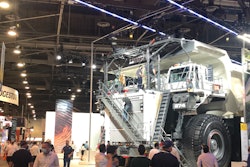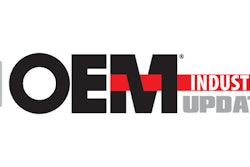
Each year, our State of the Industry issue looks at the top trends and technologies within the heavy equipment industries. We also dig into current and future market conditions, as well as regulations which may currently or in the coming years have an impact on how the industry will go about designing its equipment.
To get the best insights, we speak with executives from a variety of companies working in the industry—everyone from associations, to OEMs to component suppliers. Below are responses provided by Lars Eggers, Head of Global Business Segment Off-Highway, FUCHS PETROLUB SE.
Read all of this year's executive Q&As.
Global Markets, Government & Trade
Are there any policies you are keeping your eye on that could impact (or have already impacted) your company and the industry?
Environmental and climate protection is the most important driving force for the changes. All measures relating to this topic have a great influence on our business and have already been the basis of our business for many years. The promotion of e-mobility, the use of regenerative or CO2-neutral fuels and raw materials, stricter emission standards and the tightening of packaging regulations (recycling materials) have a direct impact on our business. In addition to the need to develop engine oils that are compatible with the new fuels and do not negatively affect the exhaust aftertreatment systems, there is a general demand for innovative lubricants with which a higher fuel efficiency can be achieved, and which allow for longer change intervals. This is best done with products that are already CO2-neutral.
Since 2020, FUCHS has already been producing all its lubricants in a CO2-neutral way (gate-to-gate scope) and we have set ourselves the goal of launching CO2-neutral products (cradle-to-gate) on the market by 2025. As this cannot be achieved by FUCHS alone, we are working closely with our suppliers on this. In addition, there are also new fields of application which we explore, such as cooling fluids (battery immersion cooling). Furthermore, we deal with services related to lubrication. For example, monitoring the lubricant to determine the optimum service life saves resources. REACH and other chemical regulations in countries and regions reduce the supply base on the raw material side and make the remaining raw materials significantly more expensive. Especially in Europe, this could lead to further consolidation in the upstream chemical industry.
How would passage of an infrastructure or other similar bill in the U.S.—or the equivalent in other countries—benefit the industry?
This, of course, has an impact on the sale of construction machinery and on the service associated with its use, which will lead to higher lubricant sales. In addition, there would be a faster renewal of the construction machinery fleet. More efficient machines and new technology would be deployed faster. It is our task to make the right lubricants available for this.
How, if at all, has the current state of the global trade tensions—particularly those between the U.S. and other countries—had an impact on your business?
Trade conflicts are generally bad for business. In individual cases it has also affected us directly and we have had to redirect the flow of goods. Because we are represented by 58 operating companies and 35 production sites in more than 50 countries, we have always been able to find a solution for our customers. We can therefore say that trade conflicts, especially sanctions, are an issue that we have to deal with constantly and tie up capacities, but that has not stopped us from developing positively in recent years. Nevertheless, we would like to see uniform rules that allow free trade under equal conditions. FUCHS always strives to manufacture locally in the regions/countries in order to be affected as little as possible by such tensions.
Supply Chain Disruptions
How have supply chain disruptions impacted your business over the past year?
The lubricants industry has been affected by supply problems through the whole of 2021 for several reasons. On the one hand, there was the unusually strong onset of winter in Texas in early 2021, which caused massive damage to the chemical industry there and is still having an impact. The corona-related lockdowns and lower fuel demand also still have an impact on refineries' base oil production. But there were and are also massive problems with the supply of raw materials on the customer side like semiconductors, which has repeatedly led to production cuts or even interruptions. All of this requires a high degree of flexibility in production in order to still be able to represent the greatest possible security of supply for our customers.
If impacted, what has your company done to try to overcome this industry challenge?
FUCHS has always relied on a broad supplier base and a long-term business relationship. If possible, we are following a two-supplier strategy for all raw materials when we start the development phase of a new formulation. This pays off in times of crisis because you can react flexibly. Due to our broad product portfolio, a worldwide production network and corresponding development know-how, we were able to find good solutions for our customers in many cases. In cooperation with suppliers and customers, alternatives for the raw materials could be identified or alternative lubricants were used.
At what point do you foresee the current supply chain disruptions becoming less of an issue?
This is difficult to predict. If there are no further major lockdowns, refinery utilization stabilizes and no other unforeseen catastrophes occur, there should be an improvement during the next 12 months.
Diesel, Electric & Other Power Alternatives
How, if at all, do you see the role of diesel engines evolving in the coming years?
In smaller machines such as compact excavators, the diesel engine will be replaced by battery electric engines in the next few years. In larger tractors, construction machines, harvesters and mining equipment, combustion engines will remain necessary for some time to come. This is due on the one hand to the high energy demand and on the other hand to the place of use, i.e. the possibility of electric energy supply. Geographical location is certainly also important here; in parts of Asia, Africa and South America, for example, the internal combustion engine will be used for a longer time than in Western countries. But will diesel fuel continue to play the dominant role or will alternative fuels (H2 or e-fuels) become more important? Price and government regulations will be decisive here.
What alternative fuels do you foresee entering the heavy equipment industry in the next 5-10 years?
At the moment, many alternatives are being discussed—biodiesel, bioethanol, BtL fuel (biomass to liquid), NH3 (ammonia), H2 (hydrogen), e-fuels and others. All of these fuels have advantages and disadvantages. The cultivation of the raw materials for biodiesel and bioethanol, for example, competes with food production and requires large areas of cultivable land. Currently, H2 and e-fuels (which are produced synthetically from green electricity, water and CO2) seem to be the favored solutions. One advantage is that surplus energy from solar or wind power plants can be used to produce these fuels and these plants can therefore be used to a greater extent. Especially in the case of e-fuels, the existing engines can be used without major adaptations. The technology to produce the fuels already exists, but there is still a need for research into energy efficiency and an improvement in production capacities and supply infrastructure.
How will electrification—or other alternative energy/power systems—continue to advance in the heavy equipment industry?
There are now some projects for the implementation of CO2-neutral mining operations. The devices are used in a spatially limited, well-monitored area, which in particular makes it easier to set up the charging infrastructure. In underground mining, the emissions-free electric drive also has a clear advantage over internal combustion engines in terms of the necessary ventilation. Carbon taxation and pressure from both the public and investors will accelerate the shift away from fossil fuels. The technology is available, now it's about secure the practicality and to improve the costs.
How will lubricants continue to evolve and meet shifting industry needs?
Lubricants are becoming more and more efficient, both in terms of reducing the friction coefficient and thus better fuel efficiency (FE), as well as improved wear protection and extended service life. Especially with engine and gear oils, the viscosity levels used are getting lower and lower. This requires the use of higher quality base oils and new additive technologies. Modern lubricants reduce the CO2 footprint directly (lower lubricant consumption) and indirectly (lower energy consumption). But new fuels, modern exhaust aftertreatment systems and the use of new materials also require adjustments to the lubricants. Whereas lubricants were long regarded as auxiliary materials, they are now recognized as construction materials without whose special properties many applications would no longer be possible.
What new advancements have been made in lubricants and how do they benefit the heavy-duty off-road equipment industry?
FUCHS is active in all industrial sectors (PC, CV and off-road vehicles) and therefore has an excellent overview of what emerges in the various segments in terms of technical requirements and solutions. From this perspective we develop products that not only meet the technical requirements, but also provide added value for our customers, true to our motto “Technology that pays back.” As a specific example, I would like to refer to the report “WHAT MAKES A PRODUCT ENVIRONMENTALLY FRIENDLY?” in our FUCHS EVOLVE magazine. The RENOLIN XtremeTemp hydraulic oils developed by FUCHS offer a long lubricant service life, good FE and excellent performance. The special composition of high-quality base oils and additives results in an optimal Total Cost of Ownership (TCO) due to low fuel and hydraulic oil consumption as well as an increase in efficiency. In other words, climate protection and cost optimization. This study shows that the industry needs a change in thinking from cheaper to more sustainable even more than before.
What sustainability initiatives is the lubricant industry undertaking?
The lubricants industry has understood that potentially disruptive changes lie ahead and is doing a lot with regard to sustainability. Apart from individual activities, it needs to be highlighted that the European and National Lubricant Associations have understood that joint activities are needed to develop harmonized standards, for example, how to calculate Product Carbon Footprints, how to evaluate corporate emissions, etc., as the available general standards leave room for a lot of ambiguities hindering comparable results on how to describe the climate impact of lubricants. Lack of such generally accepted rules will prevent from a level playing field for all lubricant marketers and leave room for Greenwashing which cannot be the interest of the industry. In fact, we need to clearly and credibly demonstrate the impact of lubricants in the application at our customers and balance this with the emissions caused in the upstream value chain. But, I would like to refer to the measures that FUCHS has taken. Compared to 2010, the energy consumption-specific CO2 emissions per tonne produced have been reduced by 26%. Production in the FUCHS-owned plants (gate-to-gate) has already been CO2-neutral since January 1, 2020. With the start of 2021, all non-manufacturing subsidiaries and all joint ventures have now also been included in FUCHS' climate neutrality—regardless of the level of FUCHS' shareholding ratio. This is our approach to create utmost transparency and fight Greenwashing. We invest in the efficiency of our plants to continuously reduce our emissions and we compensate for unavoidable CO2 emissions by investing in selected and certified climate protection projects. FUCHS only uses electricity from renewable sources in its European plants, either from its own solar powered production or by purchasing "guarantees of origin" for energy generation from a European wind power plant.
Data, IoT & Connectivity
What will be the best use cases for the Internet of Things (IoT) and data in the coming years?
One possible field would be the online monitoring of lubricants. But also the better connection of machine data with laboratory analyses for predictive maintenance and product optimization with the goal of a better TCO. Optimized lubricants and their optimal service life are also a contribution to sustainability.
What potential do you see in the use of artificial intelligence (AI) and augmented/virtual reality (AR/VR)—both for the design and manufacture of products as well as within equipment?
Artificial intelligence will be helpful in the development of lubricants. I see AR/VR more in the area of training/education. Lubricant training has historically been more like a theoretical lesson. With AR/VR, participants can virtually dive into the lubricant application. Thus, training will become more understandable and more interesting.
What challenges remain for the continued adoption of data, IoT and connectivity related technologies or systems?
With regard to the development of lubricants, the still insufficient database and the sheer volume of data to be processed has to be mentioned. When using field data, data protection and the clarification of who owns the data is certainly a central issue.
Challenges & Opportunities
What are the biggest challenges facing the industry currently, or do you see the industry facing in the coming years?
It is certainly not surprising that climate change and the associated requirements are also the central challenge for the off-highway sector. A growing world population requires increasing production of food and supply of raw materials as well as improved infrastructure and more housing. Consumers at the same time are requesting climate neutral products, services and processes. Bringing all this together requires new technologies. E-mobility, combustion engines with H2, green fuels or alternative, regenerative fuels as well as more efficient transmission and hydraulic systems are prominent examples for the many options out of which the future of mobility will be built. We are just at the beginning of a competition for the best, sector-specific solutions. This requires new, high-performance and, if possible, CO2-neutral lubricants and cooling media (battery immersion cooling). Trends towards regionalization due to political tensions lead to increased cost and resources in development in order to meet the needs of all markets.
What are some of the biggest opportunities you see in the industry?
We see the new drive technologies as well as electrification of parts of the equipment as an opportunity. The demand for lubricants per piece of equipment will decrease in the long term, but the equipment population is expected to increase in the long term. There will always be a need for high-quality lubricants, and FUCHS is well positioned here.
Are there any technologies or trends which you are currently excited about in the heavy-duty vehicle industry, or most looking forward to seeing in the coming years?
Usage of H2 in combustion engines or fuels cell is such a technology. The burning of fossil fuels must come to an end in the near future from the point of view of climate protection. H2 seems to have great potential as a substitute, even if some research still needs to be done.
What do you think will be the biggest change to occur in the heavy-duty vehicle and equipment industries in the next decade?
Here I would like to highlight three points in addition to CO2 neutrality. Diversity of drive systems, importance of data and autonomous driving, e.g. in the mining sector. Diversity of propulsion systems: ICEs (internal combustion engines) with the use of different fuels will be used simultaneously with hybrid systems, battery-electric and fuel cells for many years. This means greater complexity in production and in the supply of service products. Big Data: In a digitalized and networked world, the collection, utilization and ownership of data will become increasingly important. Empirical data determined in the laboratory or directly in the devices will increasingly flow into the development of new products. Development itself will also change, moving away from an experience-based try-and-error approach towards more computer-simulated development. Autonomous driving is currently a strong trend in the mining sector. In a well-controlled environment, such approaches can lead to increased efficiency and work safety.



















